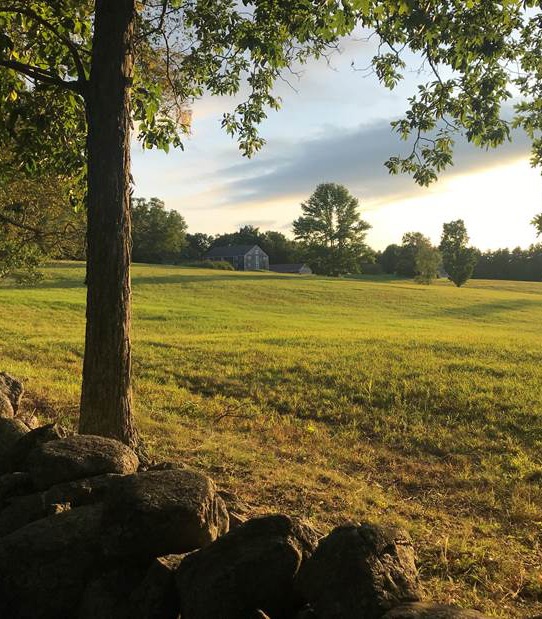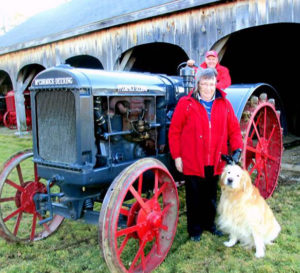Written by David Johnson
Photography by Paula Singer and Duane Hyde
For Nick and Nancy Brett, conserving their bucolic Fremont farm was about more than protecting the dirt underfoot- it was to ensure a priceless life experience can be handed down to future generations.
If you’re driving on Route 101, the busy thoroughfare that winds its way from the New Hampshire coastline to just shy of the Vermont border and happen to drive by the big green exit sign for Beede Road, you may not know that just a hop, skip, and jump from the off-ramp lies one of the region’s iconic farmsteads.
 The Brett Beede Hill Farm has carved out its own slice of cultural significance in the picturesque town of Fremont, New Hampshire (the property is highlighted in the town’s Natural Resource Inventory as one of the seven scenic resources).
The Brett Beede Hill Farm has carved out its own slice of cultural significance in the picturesque town of Fremont, New Hampshire (the property is highlighted in the town’s Natural Resource Inventory as one of the seven scenic resources).
As you crest Beede Hill Road and take in the sprawling vistas of Brett Farm, you’ll instantly understand why it’s been designated as such - and why conserving this property became such a priority for the town of Fremont, SELT, and Nick and Nancy Brett, the farm’s owners. The potential attraction for developers for this pristine landscape is through the roof.
The Bretts did not want to see their beloved farm some day turned into a series of cul de sacs. So they made the move to secure the land in perpetuity through an Agricultural Land Easement and Wetlands Reserve Easement with the Natural Resources Conservation Service and SELT.
“The Bretts realize that time is fleeting and their farm is one of their largest assets and also something they cherish,” said Duane Hyde, SELT’s Land Conservation Director. “If the Bretts did not have this sense of place and conservation ethos, the property could easily be split up into multiple lots and developed. This would result in the loss of farmland, treasured scenic vistas and important wildlife habitat.”
For Nick Brett, this project is more than wetland protection and open space preservation; it is a passing down of a lifestyle and value system that he developed and treasured as a child and, later, an adult, working on a farm.
“I grew up on my father’s farm in Madbury,” he says. “Our family moved there from Durham when I was in second grade. It was a tremendous change. All of a sudden I had important things to do rather than just get into trouble every day!”
Those tasks included growing and harvesting produce (or the family wouldn’t eat) and chopping down firewood (or the family would freeze). This immense responsibility completely re-oriented Nick’s worldview - and he realized that he became a better person because of it.
“It was a very important change in my life,” he says. “The resources we had to survive were the farm. When you get up in the morning and look out your window and see the rolling green fields and the stone walls and the farm buildings, it is a very pleasant sight. Being able to get out, to walk around on your own land, you realize you have a big responsibility. I learned this right away as a child. It was a good life and an experience very few people can get today.”
Seeing the opportunity to gift that increasingly elusive experience to others, Nick and Nancy moved to preserve their farm forever.
On Monday, December 21, SELT and the Bretts closed on a 28.86-acre Agricultural Land Easement over their farm. Substantial funding came from the Town of Fremont’s Conservation Fund and the U.S. Department of Agriculture Natural Resources Conservation Service’s Agricultural Land Easement Program, as well as the state’s Moose Plate grant program, and the Great Bay Resource Protection Partnership. In addition, the Bretts offered a generous reduction in price for the sale of the land.

“Protecting Fremont’s rural character has been the most prominent desire expressed by residents in the past thirty years as evidenced by the Town’s Master Plan and community surveys,” says Leanne Miner, Chair of the Fremont Conservation Commission. “Balancing Fremont’s land uses for residential and commercial development with agricultural uses is Goal 1. Building awareness about conserving agriculture is also at the top of the Town’s Conservation Commission plans for 2021 and the Brett property is a perfect example of making this work for the Town and the property owner.”
The Agricultural Land Easement ensures that the Brett Farm continues to have the opportunity to be a working farm in the future. The Bretts have already begun some preliminary farm succession planning, reaching out to friends, family members, and associates to pinpoint the next farmer to take over the farm (the hay fields rooted in the farm’s rich agricultural soil have been a key cog in the local food system by providing feed to local beef and dairy operations).
“Having the farm protected by conservation easements will make it much more affordable for a future buyer,” said Duane.
“The idea of preserving this for future generations seemed like a really nice thing to do,” Nick said. “Even if I may not be able to enjoy it some day, I know that it would be a tremendous source of enjoyment for other people.”
For now, the Brett Farm is still home sweet home for Nick and Nancy. It is a place that houses an impressive antique tractor collection - highlighted by a series of early 1900s International Harvester (the tractor with the gigantic steel wheels) - that Nick has painstakingly restored himself. Nancy is a dog trainer and Russell, their Golden Retriever, can often be seen patrolling the farmland.
Nick takes a moment to recount a Christmas card he received this year. It was from the family that purchased his father’s Madbury farm and continues to work the land as the Brett family had done generations before (thanks to Nick’s first experience with conservation, when he secured an easement for his family farm). Two families, kindred spirits in a lifestyle that has become less and less prevalent.
When Nick reads that card, it is a reminder he’s done the right thing with his own land. Brett Farm is a precious gift, its value found beyond the soils and stone walls; it is a serene and bucolic snapshot of Americana where character is forged and values are harvested, a Yankee treasure which, thanks to Nick and Nancy Brett, is preserved forever in the countenance of the rolling New Hampshire hillsides.


